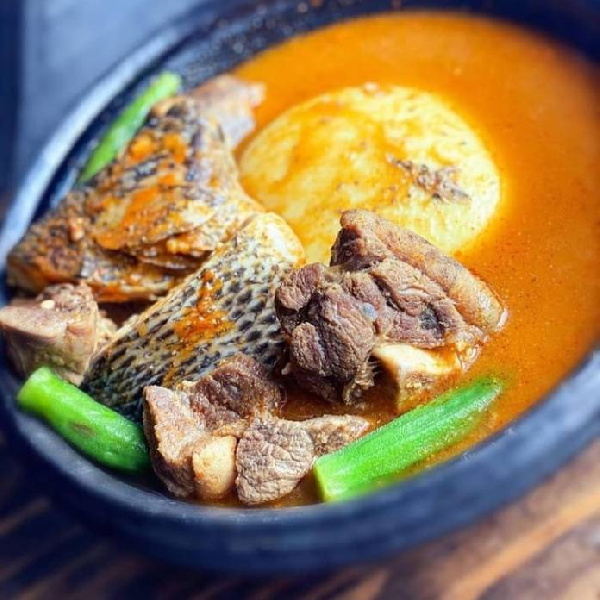As a 21st-century child, I recall hearing stories about how my parents only got to eat rice during the Christmas holidays and had to share soft drinks with each other, but it was still a wonderful time for them. “Now you kids enjoy rice at any time and have the luxury of purchasing whatever beverage of your choice on your own, so you don’t know what Christmas really means,” every parent would say.
However hearing these stories always gave a sense of belonging and pride that I am fortunate enough to have this luxury. Today we will be looking at the food culture of Ghanaians during Christmas, is it still rice served with chicken tomato sauce with a chilled beverage by its side or there have been changes?
Cooking and eating together are hallmarks of Ghanaian food culture during the Christmas season. In contrast to our country, there is no roast, only stews and rice. Have you ever wondered how Ghanaians celebrate Christmas? It is distinguished by the family, much like our Christmas.
Such customs are meaningful and, more importantly, contribute to the well-being of a community. In this article, we’ll take a closer look at Ghanaian food culture and the Christmas holiday. Ghana’s culinary culture There is one word that characterizes Ghanaian food above all others: spicy. Pepper, which means hot chili, is one of Ghana’s most important spices. Ghanaians eat a lot of rice, as well as dishes made with corn flour and tomatoes. Rice, semolina, yams, banku, kenkey, sweet potatoes, or plantains make up the majority of the diet.
Ghanaians prefer to eat all of their meals warm, and a cold snack. The right hand is used to eat. This practice has a lot to do with Ghanaians’ values. More information can be found here. The conventions of the Global North have taken root in some restaurants, and cutlery is available for eating. However, eating with your hands is deeply rooted in Ghanaian culture and is an important part of Ghanaian food culture.
Breakfast is only eaten on rare occasions, usually around 10 – 11 a.m. in the form of a hearty snack. Soup or beans with a sauce, for example, are served for this late breakfast. A sugarbread, which is similar to a milk roll, is eaten for a sweet breakfast.
Fish is commonly consumed along the coast, whereas meat is consumed on a less frequent basis. This is due to a variety of factors, not just the high cost. If it is served on special occasions, it is usually in the form of a long-cooked dish. This makes sense because the meat can be preserved in this manner for a longer period of time at high outside temperatures. A medium rare steak, on the other hand, will not be found on the plates of Ghanaians. Because of its low cost, chicken is frequently served when meat is consumed.
We previously discussed the importance of the family in Ghana in another article. The significance of eating and cooking together is very similar. Traditional Ghanaian dishes are not light in flavor. They are cooked in a heavy, fatty, oil-rich sauce. They are typically prepared in a pot rather than a pan. As a result, food is cooked for a longer period of time rather than fried for a short period of time. This is related to the previously mentioned food preservation. The dishes are frequently prepared over an open fire in the open air.
Eating habits vary greatly from region to region, but also from city to rural areas, as they do in any other country. As a result, one cannot speak of a single eating habit. Sweet potatoes are popular in the south, while semolina, millet, and corn are popular in the north. People eat fish in the south and meat in the north due to access to water.
But what do Ghanaians eat? Have you ever heard of the term “Fufu”? Ghana’s national dish is fufu. It is made up of a plantain and yam mash (a root that tastes similar to a potato). The regularity of this porridge is often described as chewing gum-like. This mash is served with a thin vegetable soup, or peanut soup. It is eaten with the hands.
. Because of the emotional connection with positive emotions and the family, celebrations are generally considered to be beneficial to the community. Hence the close connection with recurring processes and rituals performed by the community.
Eating together with the family is one such ritual and is an important part of the eating habits of Ghanaians at Christmas. In Ghana people of Christian and Muslim faith live door to door. Not only the Christian holidays are free, but also the Muslim holidays are official holidays in Ghana. Traditionally, at Christmas in Ghana a stew is prepared with goat or chicken meat. Rice and fruits are served with it.
Share your holiday experiences with us.
SOURCES
https://fairafric.com/en/ghana-and-christmas-the-ghanaian-food-culture-at-christmas-time/


